Headlines
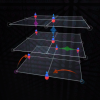 In a new study published in Science, researchers from JILA and CU Boulder used ultracold molecules to model the quantum dynamics and phases underlying high-temperature superconductors. Their work opens new doors for quantum simulations and advances in quantum technologies.
In a new study published in Science, researchers from JILA and CU Boulder used ultracold molecules to model the quantum dynamics and phases underlying high-temperature superconductors. Their work opens new doors for quantum simulations and advances in quantum technologies. A team of theoretical physicists from Colorado have designed a new type of “game” that uses a quantum computer—a device that performs calculations by manipulating small objects like atoms—to precisely shuffle ions around a very small grid, like the world's tiniest game of checkers.
A team of theoretical physicists from Colorado have designed a new type of “game” that uses a quantum computer—a device that performs calculations by manipulating small objects like atoms—to precisely shuffle ions around a very small grid, like the world's tiniest game of checkers.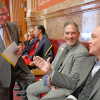 Dignitaries from CU Boulder joined the Colorado General Assembly at the State Capitol on Monday, April 14, to celebrate World Quantum Day, a global event celebrating how quantum physics has transformed the lives of humans around the globe.
Dignitaries from CU Boulder joined the Colorado General Assembly at the State Capitol on Monday, April 14, to celebrate World Quantum Day, a global event celebrating how quantum physics has transformed the lives of humans around the globe.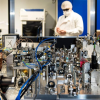 Infleqtion’s star continues to rise as Colorado’s quantum hub grows. The company of firsts, spun out of CU Boulder as ColdQuanta, seems to be everywhere these days, including outer space, while commercializing pioneering research to address needs across several critical markets.
Infleqtion’s star continues to rise as Colorado’s quantum hub grows. The company of firsts, spun out of CU Boulder as ColdQuanta, seems to be everywhere these days, including outer space, while commercializing pioneering research to address needs across several critical markets.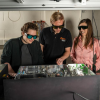 A team of CU Boulder researchers led by Juliet Gopinath (Electrical, Computer and Energy Engineering) has introduced a quantum sensing technique that could lead to improvements in how we monitor infrastructure, detect changes in the environment and conduct geophysical studies.
A team of CU Boulder researchers led by Juliet Gopinath (Electrical, Computer and Energy Engineering) has introduced a quantum sensing technique that could lead to improvements in how we monitor infrastructure, detect changes in the environment and conduct geophysical studies.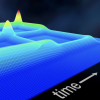 Using universal programmable atom-optic “gates,” Professors Murray Holland (JILA, Physics) and Professor Marco Nicotra (Engineering) and their teams have developed a platform where a single device can be reconfigured via software to perform a wide range of precision measurements without hardware changes.
Using universal programmable atom-optic “gates,” Professors Murray Holland (JILA, Physics) and Professor Marco Nicotra (Engineering) and their teams have developed a platform where a single device can be reconfigured via software to perform a wide range of precision measurements without hardware changes. Researchers at JILA, led by Ana Maria Rey, developed a new protocol for teleporting quantum information in collective spin states of ions within a two-dimensional crystal. The protocol, successfully simulated with up to 300 ions, shows potential for quantum networks and distributed quantum sensing.
Researchers at JILA, led by Ana Maria Rey, developed a new protocol for teleporting quantum information in collective spin states of ions within a two-dimensional crystal. The protocol, successfully simulated with up to 300 ions, shows potential for quantum networks and distributed quantum sensing.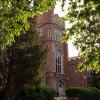 The Research & Innovation Seed Grant program will fund 15 new projects for up to $60K each. Including the 2025 investments, the program has provided more than $18.7M to fund more than 400 innovative projects across campus since 2008.
The Research & Innovation Seed Grant program will fund 15 new projects for up to $60K each. Including the 2025 investments, the program has provided more than $18.7M to fund more than 400 innovative projects across campus since 2008. Ben Chapman (PhDPhys’17), a Principal Quantum Hardware Manager at Microsoft, says what he loves most about physics is “the sense of awe that comes from connecting with length, time and energy scales that are far from the meters, seconds and joules of the human experience.”
Ben Chapman (PhDPhys’17), a Principal Quantum Hardware Manager at Microsoft, says what he loves most about physics is “the sense of awe that comes from connecting with length, time and energy scales that are far from the meters, seconds and joules of the human experience.” Ruzzene, who serves as Senior Vice Chancellor for Research & Innovation at CU Boulder, discusses how the university is building on Colorado's historical success in quantum to accelerate the translation of new discoveries into real-world applications that benefit society.
Ruzzene, who serves as Senior Vice Chancellor for Research & Innovation at CU Boulder, discusses how the university is building on Colorado's historical success in quantum to accelerate the translation of new discoveries into real-world applications that benefit society.

